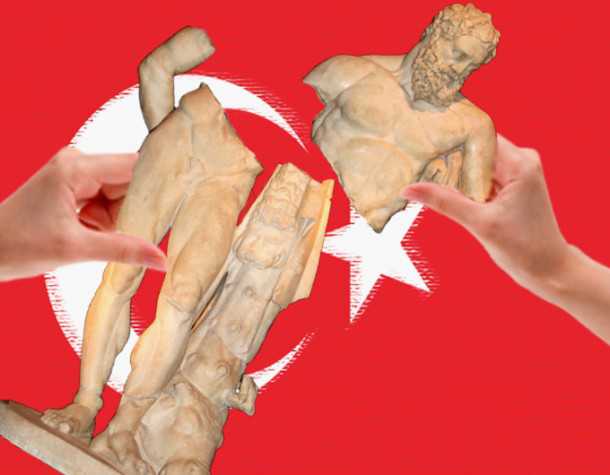
View Photo Gallery — Protests continue in Turkey: Prime Minister Recep Tayyip Erdogan acknowledged that some Turks have taken part in the protests out of environmental concerns but insists that terrorist groups are involved in the unrest.

Anti-government protests in Turkey: As Turkey experiences its fiercest anti-government rallies in years, the prime minister rejects claims that he is a dictator.
Assad. In areas plagued by violence from a Kurdish militant group, residents dislike Erdogan’s efforts to broker peace. The one issue that unites protesters across Turkey — especially the young, college-educated residents who dominate the turnout — is a fear that dearly held personal liberties are slipping in favor of religious conservatism.
Erdogan, whose party won a powerful parliamentary majority in 2011 elections, retains broad support among religiously conservative voters, who feel that he is giving them a voice after years in which they had felt neglected. Even among protesters, few expect him to be deposed. But the demonstrations — in at least 78 towns and cities across Turkey, by an Associated Press count — have given an outlet to those whose frustrations have been long pent-up.
“Wherever there is opposition to policies, protests arise in those places,” said Cengiz Candar, a columnist for the Radikal newspaper. “Istanbul is the sum total of Turkey,” he said, the cauldron in which all the issues come together.
But if Erdogan is to end the worst crisis of his 10 years in office, analysts say, he may have to address a far broader constituency.
‘Bastion of the old republic’
This weekend in Izmir, a city of 2.8 million, tens of thousands of protesters jammed a prime stretch of waterfront, lighting green and red flares that twinkled against the lapping waters of the Aegean. They chanted slogans about the military and Mustafa Kemal Ataturk, the fiercely Westernizing founder of modern Turkey who restricted head scarves in the halls of government and tried to tie the country to Europe.
And they flew red Turkish flags on which Ataturk’s image was superimposed on the star and crescent — a formulation that one senior Erdogan official said last week was as provocative as the Confederate stars and bars in the United States.
“Izmir never gave up. For 10 years, we have been rebelling. Izmir is the last bastion of the old republic, so it will be the last one remaining in the struggle,” said Murat Gural, 38, who works at a real estate firm and was listening to nationalist songs at the protest Saturday. He said that when the protests started in Istanbul, “we said, ‘Thank God! Finally!’ ”
Others echoed sentiments similar to those in Taksim Square.
Elsewhere in Turkey, issues are as diverse as the nation of 74 million itself, although most have at least some representation in Istanbul. Across the country, protesters have been largely — but not exclusively — young, middle-class and educated. On Friday, Islam’s holy day, about 100 protesters in Istanbul performed their midday prayers in Taksim Square, in part to emphasize that not all of those who have come out against Erdogan are secular.
In the capital, Ankara, where police have repeatedly clashed violently with protesters, including on Saturday night, opposition political parties have a stronger presence than in Istanbul, said one protester, though the demands for freedom remain similar and the parties have not sought a leading role.
Opposition parties are “trying to do something to keep the protests going,” said Coskun Yildirim, 35, a civil servant in Ankara who said he has been attending rallies at a public park every night.
Near the Syrian border, in the southern province of Hatay, local journalist Akin Bodur said that more than a thousand people have been gathering every evening in a square, where they sing anti-government songs. Others bang on pots and pans, as protesters have been doing across the country.
One protester there said that the initial objections to the razing of a park in Istanbul were faint by the time they reached across the country and that anger was far stronger about Erdogan’s 2011 withdrawal of support for Assad.
“Most of the people in Hatay are angry that Erdogan made a U-turn and brought guys with arms whom we don’t know into our city,” said Maral Arli, 29, a lawyer who spoke by phone from a demonstration this weekend where people were chanting, “Taksim is everywhere; resistance is everywhere.”
On Sunday, Erdogan gave several defiant speeches before crowds of thousands of supporters in several cities in central and western Turkey.
“Those who burn and destroy are called looters,” he told a crowd in Ankara. “Those who back them are of the same family.”
The sharp rhetoric has many people worried about what comes next.
“For now, it’s nice. But I know Turkish history,” said Omer Turkes, a literary critic and political activist in Izmir who was a prominent opponent of Turkey’s military-dominated government before Erdogan came to power. “I’m afraid this government will do something to open deeper wounds in these young people’s lives.”

Asli Sozbilir contributed to this report.

